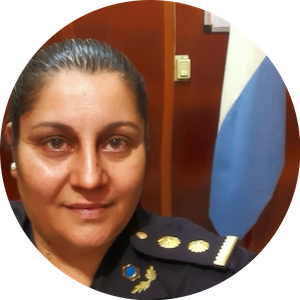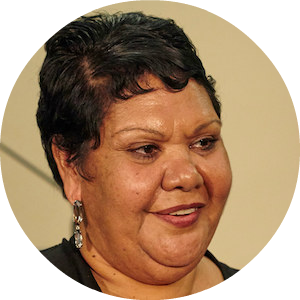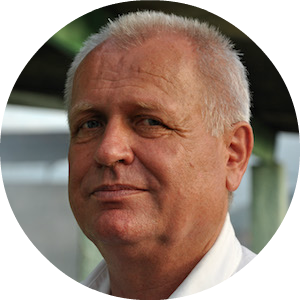Desmond Tutu Reconciliation Fellowship
Nominations for the NEXT Desmond Tutu Reconciliation Fellowship expressions of interest are now open.
For this year’s award, we are seeking to honour a person or group whose work has helped activate dialogue and practice in support of a sustainable resolution to the current crises in war and conflict. At this point we are seeking Expressions of interest relating to achievements contributing to understanding and promotion of peace in the current war and conflict crises.
Desmond Tutu Reconciliation Fellows
Sitting Fellow - Romina Caldera
Romina Caldera is the Commander of Police for Women and Families of Berriso Women’s Police Station (Comisaria de la Mujer) in La Plata, Argentina. The network of Women’s Police Stations, operating within the traditional police system, provide safe spaces for addressing violence within families through caring and educational programs and strategies and are able to prevent many femicides and instances of gender violence. Romina undertakes her work in one of the most challenging neighbourhoods of La Plata. Romina has provided a model which has spread across the country and further.
Sitting Fellow - Tambudzai Glenda Muzenda
Tambudzai Glenda Muzenda is the Board Chair of Ceredev and Sustainability Lead at Symphonia, South Africa, and is particularly notable for her focus on Uncomfortable Conversations which bring men into conversation with women and each other to address difficult issues. This method of conversational learning has brought different population groups to meet at eye level to deepen understanding of gender relations and demystify myths and misconceptions. Tambu is an inspirational presence who actively leads on the basis of personal conviction, connecting local gender related experience to institutional policy development.
Sitting Fellow - Safiya Ibn Garba
Safiya Ibn Garba is Founder and Program Director of Empowering Women for Excellence Initiative (EWEI) in Kaduna, Nigeria, and recently recognised by Union Bank Nigeria as one of the twelve CSOs making an impact in Nigeria in the category of Gender Equality. She leads, mentors and mobilises volunteers and facilitators and lobbies governments for support and policy changes.
2018 Zeremariam Fre
Zeremariam Fre has been a prominent figure and highly influential academic, civil society leader and development practitioner on pastoralism and environmental management over the past three decades. He has been a passionate and committed spokesperson for marginalised pastoralists in Eritrea, Ethiopia, Somaliland, Sudan and Uganda, facilitating knowledge sharing and cooperation across communities and borders. In 1989, Dr Fre founded the Pastoral and Environmental Network in the Horn of Africa (PENHA), an international NGO whose mission is to reduce poverty among pastoralists through the empowerment of communities and fostering the development of sustainable and dignified livelihoods.
2017 Emmanuel Jal
Emmanuel Jal is a former child soldier, an established and accomplished musician, author and performer and a peace ambassador who has presented to the UN and the US Congress. Jal is the architect of the We Want Peace campaign which helped attract international attention to the suffering in South Sudan through the 2011 independence process. The 2008 documentary Warchild depicts his life and shares his remarkable ability to turn hatred and bitterness into a life of peace. Emmanuel founded his own charity, Gua Africa, which sponsors South Sudanese refugees through a survivors of war program and promotes education in Africa for displaced people through academic sponsorship.
2016 June Oscar
June Oscar AO is an Australian Aboriginal of Bunuba descent, indigenous rights activist, community health and welfare worker, and film & theatre producer. Oscar is best known for her fight against Fetal Alcohol Spectrum Disorder and work in improving the lives of Aboriginal people in remote communities. In 2007, she led the successful campaign for alcohol restrictions in the town of Fitzroy Valley. On 10 June 2013, Governor-General of Australia Quentin Bryce awarded Oscar an Officer of the Order of Australia, for ‘distinguished service to the Indigenous community of Western Australia, particularly through health and social welfare programs.
2013 Aung San Suu Kyi
Aung San Suu Kyi AC is a Burmese opposition politician and chairperson of the National League for Democracy in Burma. After years living and studying abroad, she returned to Burma in 1988 to find violent protests against military rule. Speaking out against the Myanmar Government she was placed under house arrest until finally being released in 2010. She is chair of the National League for Democracy (NLD) and is contesting the 2015 Presidential elections. For her stand on peace and democracy she received many international awards, including the Nobel Peace Prize in 1991.
2012 Nanko Van Buuren
Nanko Van Buuren, may his gentle soul rest in peace, worked for over twenty years in some of the most violent favelas of Rio de Janeiro, Brazil, building community-engaged and sustainable responses to violence, organized crime and social exclusion. Remarkably, through his organization, Instituto Brasileiro de Inovações em Saúde, Nanko established simultaneous working relationships with government and with dozens of shanty-town communities, including those at war with one another.
2011 Modjtaba Sadria
Fellowship withdrawn 2016.
2009 Ian Campbell
Ian Campbell is an Australian-trained doctor based in London, formerly Director of the International Health Division of the Salvation Army, now the Founding Director of Affirm Associates, which he funds from his own part-time work as a doctor. Affirm helps facilitate community responses to HIV and AIDS.
2009 Katarina Pejovic
Katarina Pejovic is an artist based in Zagreb, Croatia, who is working in an urban environment to reconstruct the possibility of community in a time of ruthless social change.
2009 Elizabeth Langslow
Elizabeth Langslow is a documentary film-maker who has worked in Uganda and Central Australia. Elizabeth is based in regional Victoria and works with ACMI and local government in “digital storytelling”.
The Desmond Tutu Reconciliation Fellowship recognises and supports people from all walks of life as they contribute to reconciliation projects within, between and across communities. The Reconciliation Fellowship supports activities undertaken by individuals that facilitate dialogue and practical engagement aimed at enhancing understanding and developing collaboration. It promotes reconciliation by bringing global support to individuals engaged in local projects.
Tutu Reconciliation Fellows are appointed on the basis of their work in the broad area of reconciliation. A key consideration in the selection process is the likelihood that a person’s ongoing work will generate deep and sustainable outcomes that advance reconciliation in one or more communities.
The Tutu Fellowship provides recognition and support to enable people from all walks of life to explore and develop the reconciliation dimensions of a particular project, activity or issue.
Expectations of Tutu Reconciliation Fellows
We ask that Fellows continue to act in harmony with the principle of Global Reconciliation: to promote by non-violent means processes of dialogue and practice across boundaries of continuing difference.
As recipients of the Reconciliation Fellowship, and in keeping with our principle of public dialogue, we ask that Fellows provide us with brief annual reports on their work that we can make public. We also request that Fellows make themselves available to support other members of the global reconciliation community where appropriate and as the need arises.
| DESMOND TUTU RECONCILIATION FELLOWSHIP OBJECTIVES |
|---|
| To support community-based activities that promote reconciliation. |
| To develop experiences, knowledge and expertise in relation to grass-roots reconciliation projects. |
| To provide fertile and supportive environments in which the various themes of and diverse perspectives on reconciliation can interact with and support each other. |
| To foster a learning process in reconciliation that utilizes the powerful contemporary resources of communication. |
| To contribute to the development of a living archive of reconciliation resources documenting reconciliation experiences and supporting their sharing and dissemination through forums, web-based notice boards, and networks. |
There are no prescribed qualifications, academic or otherwise, for the Tutu Reconciliation Fellowship. Merit is the primary basis, and prospective Fellows are judged on past achievements and demonstrated ability for future achievement in any walk of life. The value of an prospective Fellow's work to the community, and the extent to which that work will be further enhanced by being awarded the Fellowship, are important criteria.
A short list of applicants is compiled and a decision is made after extended consideration of candidates. Currently, the process is by nomination only. Nominations are sought broadly through the outreach of Global Reconciliation Executive or Board members.
There is no defined monetary award associated with the Fellowship. However, Global Reconciliation will be pleased to support and advance the work of a Fellow, including through showcasing his or her achievements and on-going activities and, where appropriate, by providing in-kind assistance for approaches to government and non-government organizations for recognition or support. Where appropriate we will seek funding on mutual projects with Fellows.
| TUTU RECONCILIATION FELLOWSHIP SELECTION PROCESS |
|---|
| 1. Nominations will be invited and a closing date for nominations published. |
| 2. Prospective Fellows are required to provide two referees who will be asked to provide a written reference. |
| 3. Nominations should include a proposal for future work in the area of reconciliation (this may or may not be treated as the basis for a limited-term funded project with financial support). |
| 4, Prospective Fellows may be invited to attend an interview with the selection panel. Where appropriate, advice and guidance may be offered to applicants about how to improve their proposals to enhance the contribution they may be able to make. A key issue to be taken into account will be the likely outcomes of the proposed project for the communities it will involve. |
| 5. Global Reconciliation Executive will consider nominations and make a recommendation to the Board, who will make the final decision. |
| 6. Appointed Fellows, subject to mutual agreement, may hold the status for life and may use the initials FGR after their name as sign of public recognition. |
| 7. Fellows are encouraged to identify and submit materials of any kind which may be of assistance to others working in their fields. |
+ Will you tell me where to go or what to do?
The nature and conduct of individual Fellow's projects are decided by the Fellows themselves, although we may provide some advice and guidance about how you might like to proceed.
+ I’ve just finished school or I am a student. Can I get a Tutu Reconciliation Fellowship?
It is unlikely that you will be selected. The award of a Tutu Reconciliation Fellowship implies recognition of past achievement and demonstrated ability for future achievement in the applicant’s field.
+ Am I too young or too old to get a Tutu Reconciliation Fellowship?
You must be over 18. There is no upper age limit for the award of a Tutu Reconciliation Fellowship. However, demonstrated ability for future achievement in your particular field will be taken into consideration.
+ Can I apply for a Fellowship with someone else or as a group?
Fellowships are awarded on an individual basis only. However, we appreciate that in many cases they will involve group activities involving members of different communities. This will be taken into account in the selection process.
+ Who are the Tutu Reconciliation Fellowship panel?
Moira Rayner, Chair
Professor Paul James, Advisor: p.james2@uws.edu.au
Professor Paul Komesaroff, Advisor: paul.komesaroff@monash.edu
Victoria Baldwin, Advisor: victoria.baldwin@globalreconciliation.org













